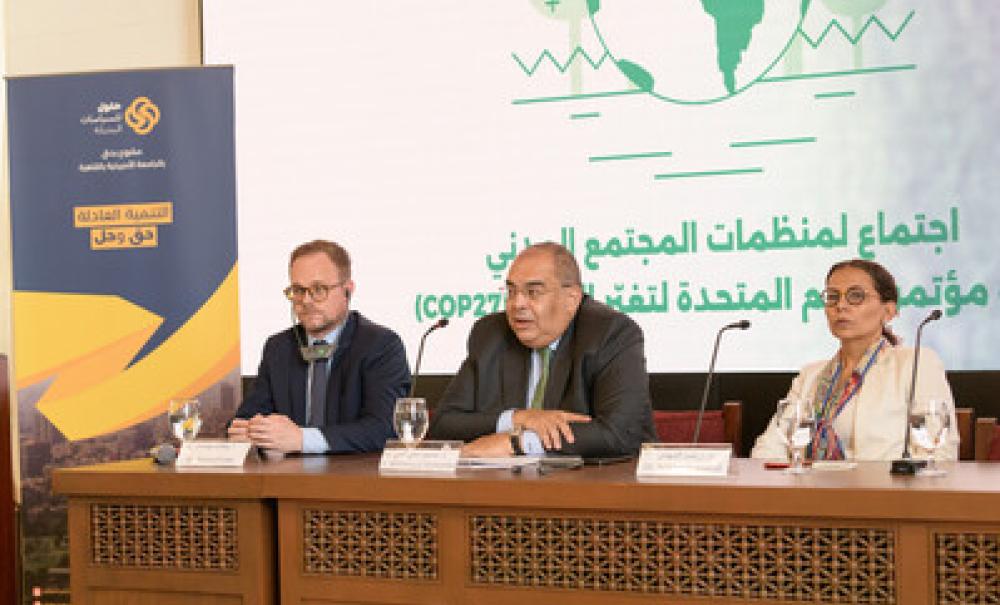
The Road to Sharm El Sheikh: Preparing for COP27
“We have a large challenge ahead of us –– the fight against climate change. This is the largest challenge for mankind,” said Ambassador Frank Hartmann, Germany’s ambassador to Cairo during “The Road to Sharm El Sheikh” civil society COP27 meeting.
In preparation for COP27, Alternative Policy Solutions, a public policy research project at AUC headed by Rabab El Mahdi '96, '98, associate professor of political science, hosted "The Road to Sharm El Sheikh” in cooperation with Friedrich Ebert Stiftung-Egypt. The event brought together more than 50 civil society associations and key government representatives to discuss climate change strategies and policies ahead of COP27 this fall.
“COP27 is a huge opportunity for Egypt, for Egyptian civil society to show what knowledge [they] have, how [they] can help and assist in solving problems on a local level. … Most importantly, it’s an opportunity for the world,” said Richard Probst of Friedrich-Ebert-Stiftung – Egypt. “A successful COP is not only important for a country but important for all of us –– Global North, Global South, government, civil society –– and therefore we are very happy that we found with AUC, APS, Rabab El Mahdi and all her team the most valuable partner to convene this workshop.”
Hartmann pointed out that Germany is preparing for a visit by Egypt’s President Abdel Fattah Al-Sisi to Germany and organizing a bilateral international conference, Petersburg Climate Dialogue, co-chaired by Egypt and Germany, to discuss climate policy and bilateral issues. “We are giving all our support to the Egyptian preparations for COP27,” he said.
Ambassador Mohamed Nasr, director of the Environment and Sustainable Development Department at the Ministry of Foreign Affairs, affirmed the need to move beyond pledges to implementation on the ground. “Our vision for COP27 is clear and focused,” he said. “We spent six years negotiating the Paris Rulebook, and it's time now to transition from commitments and pledges to concrete action and specific deliverables. Science tells us that we are most certainly off track and that the window of opportunity is rapidly closing. It’s clear that we need urgent action through scaling up and implementing mitigation ambition.”
Adaptation and finance are also key. “We need to ensure effective and well-resourced adaptation and solid resilience solutions, and deliver a solid adaptation agenda,” added Nasr. “We need to ensure the provision of reliable, appropriate and predictable finance to assist developing countries in making their contribution to the global effort in line with their needs and circumstances. And we need to find a way forward to assist in averting, minimizing and addressing loss and damage. And since this COP is taking place in Africa, we need to deliver on some of the most prominent African priorities as well and be able to reflect on the needs and be cognizant of the circumstances of our continent.”
Mahmoud Mohieldin, UN Climate Change High-Level Champion for Egypt and executive director of the International Monetary Fund, noted that COP27 “requires a lot of coordination between climate change priorities on one hand and sustainable development on the other.” Watch Mohieldin’s full speech (in Arabic).
Lama El Hatow’05, ’07, climate and environmental expert, highlighted some of the global challenges we face today that make the situation even more difficult: “We need to put into consideration that we’re in a world order that is changing quite rapidly, whether it’s the COVID pandemic, war in Ukraine, energy and food security issues, and, of course, the divided politics that exists in the global setting when it comes to climate change negotiations: developed vs. developing countries, historical responsibilities vs. industrialized countries that caused the problem. These are the dynamics that continue to play until today in terms of how we are able to move forward.”
Echoing the same sentiment, Arne Lietz, former member of the European Parliament and initiator of the Report of the European Parliament on Climate Diplomacy, said, “We have to think toward a whole spectrum, and therefore I really like that this COP27 takes [it] up a new level, which is race to resilience. This is a new topic that really fulfills [not only] how we can embed the 2030 UN Sustainable Development Goals, but also [integrating] civil society on all levels.”
In light of all this, an inclusive and participatory dialog is essential, Nasr emphasized. “It is our belief that each constituency of the broader spectrum of civil society is an integral part of the solutions to what we see,” he said. “Youth, women, academia, private business, workers, farmers, environmental NGOs, in addition to parliamentarians, media, faith-based organizations and persons with disabilities – All are bringing and will continue to bring fresh energy, real-world perspectives and innovation to be integrated into the deliberations and outcomes.”
Nasr highlighted three important pillars for COP27:
- Keeping our ambition high with no backsliding
- Taking the voices of developing countries into consideration and delivering a transformative adaptation agenda as well as delivering on loss and damage, with equity and a just transition
- Appropriate finance in line with needs
“We need to think of why we are going to Sharm El Sheikh,” reflected Nasr. “We are all facing an existential threat for us and future generations. This is a COP for implementation. It is time to make those pledges … action on the ground.”